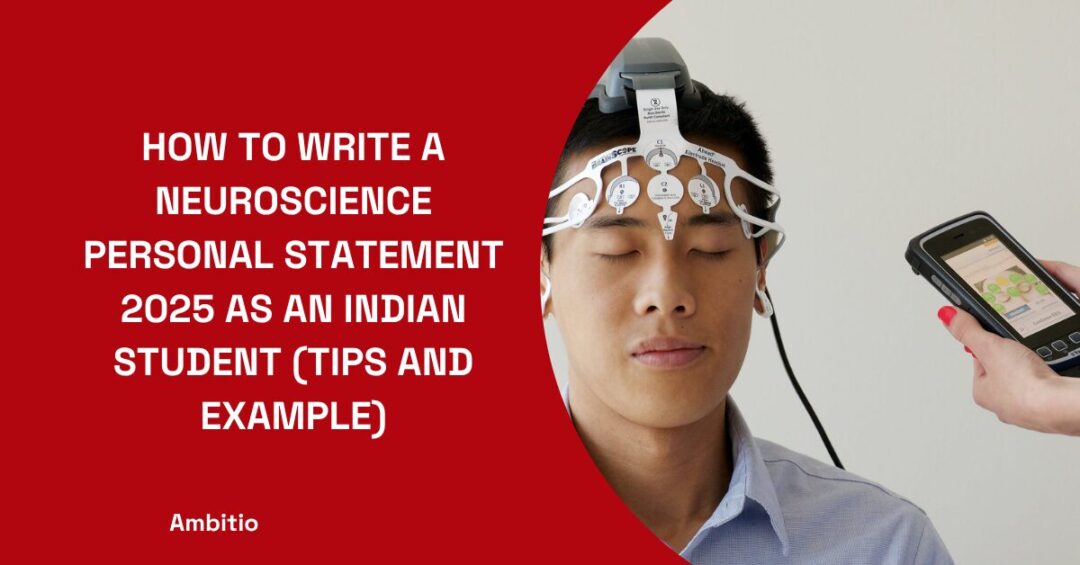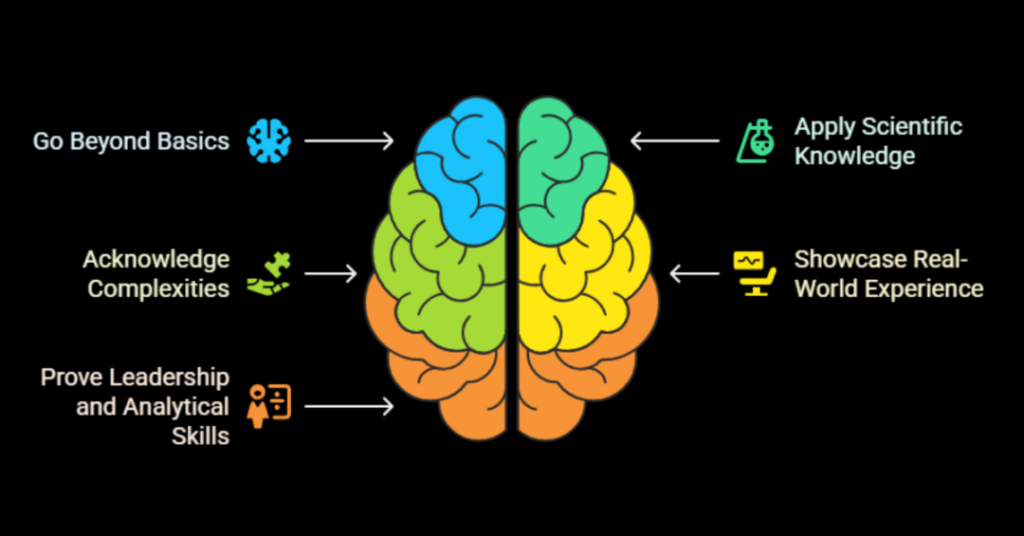11 August 2025
5 minutes read
How To Write A Neuroscience Personal Statement 2025 (Tips And Example)

Key Takeaways
- A strong neuroscience personal statement should focus on your unique connection to the field, not just your fascination with the brain.
- Real-world experiences such as internships or volunteer work in neurology can make your statement stand out.
- Acknowledge the complexities of neuroscience and show your readiness to tackle them in your academic journey.
Neuroscience is the only field where your personal statement can literally be the key to unlocking your future. But here’s the catch—most applicants get it wrong. They write about the brain like it’s just another biology subject, or worse, they regurgitate the same tired ‘I’ve always been fascinated by the brain’ line.
The admissions committee has heard it a hundred times. The real trick is to make your statement human—show how your understanding of behaviour, human brain, ethics, and psychology connects to your drive for this degree. Dive into your personal connection with the degree course, and don’t just explain why you’re interested in neuroscience, show why you’re the right fit. The best personal statements don’t just describe you; they reveal you.
5 Great Tricks To Write The Perfect Neuroscience Personal Statement
Let’s get one thing straight: your statement of purpose won’t get you into King’s College London if it’s just a rehash of “I’ve been fascinated by the brain since a young age” with a sprinkle of basic biology knowledge. That’s not going to cut it. You need something more—something that blends your unique experiences, a deep understanding of the nervous system and brain, and the real reason you want to study this fascinating organ.

This isn’t high school anymore; you’re entering the realm where knowledge of neurobiology, medical science, and even neurology have to mesh with your own scientific understanding of processes. Here are 5 tricks to make your neuroscience personal statement stand out in a way that not only shows you know your stuff but also gets the bigger picture.
1. Go Beyond the Basics of Biology
Don’t just say you’re fascinated by the brain. Talk about the structure and function of neurons, discuss neurological conditions like dementia, and share how experiences, such as your work with neurobiology or optional work placements, shaped your understanding. Be specific and bring in figures like Cajal to show your depth.
2. Apply Your Scientific Knowledge
Anyone can talk about biology. Show how you’ve applied your scientific knowledge to real-life problems, from understanding brain functions to studying neurodegenerative diseases. This will prove you’re not just another science student but someone who can bridge theory with practice.
3. Acknowledge Neuroscience’s Complexities
The brain is messy, complex, and full of unanswered questions. Don’t shy away from this in your personal statement. Discuss how you’re ready to explore the boundaries of neuroscience, whether it’s abnormal brain functions or studying neurological diseases.
4. Showcase Real-World Experience
Your statement should highlight more than just academic knowledge. Talk about your work experience, whether with Asperger’s syndrome, neurology labs, or voluntary placements. These will show you can apply your understanding of the nervous system outside the classroom.
5. Prove Your Leadership and Analytical Skills
Neuroscience isn’t just about memorizing facts. It’s about critical thinking and leadership. If you’ve led projects or analyzed complex data, highlight these experiences to show you have both the analytical skills and leadership qualities to excel in this field.
10 Undergraduate Universities To Study Neuroscience
The United States is home to some of the best neuroscience programs in the world, offering state-of-the-art research facilities and top-tier faculty. If you’re looking to pursue an undergraduate degree in neuroscience, you’re in luck. The U.S. boasts numerous prestigious universities where you can immerse yourself in the fascinating world of the brain and nervous system.
Here’s a look at 10 of the top universities in the U.S. for studying neuroscience, along with some essential details like average tuition fees, potential salary post-graduation, and other necessary application documents.
| University | Average Tuition Fees (per year) | Average Salary (Post-graduation) | Other Documents Required |
|---|---|---|---|
| Harvard University | $54,002 | $70,000+ | Statement of Purpose, Letters of Recommendation, Transcripts |
| Stanford University | $56,169 | $75,000+ | Statement of Purpose, Letters of Recommendation, Transcripts |
| Massachusetts Institute of Technology (MIT) | $53,790 | $80,000+ | Statement of Purpose, Letters of Recommendation, Transcripts |
| University of California, Berkeley | $42,326 (Out-of-State) | $60,000+ | Statement of Purpose, Letters of Recommendation, Transcripts |
| Johns Hopkins University | $58,720 | $70,000+ | Statement of Purpose, Letters of Recommendation, Transcripts |
| Princeton University | $53,890 | $72,000+ | Statement of Purpose, Letters of Recommendation, Transcripts |
| Columbia University | $63,530 | $80,000+ | Statement of Purpose, Letters of Recommendation, Transcripts |
| Yale University | $55,500 | $68,000+ | Statement of Purpose, Letters of Recommendation, Transcripts |
| University of California, Los Angeles (UCLA) | $43,000 (Out-of-State) | $60,000+ | Statement of Purpose, Letters of Recommendation, Transcripts |
| University of Chicago | $59,298 | $72,000+ | Statement of Purpose, Letters of Recommendation, Transcripts |
A Personal Statement Example That Always Works For Everyone
You could spend hours staring at a blank page or repeating the same tired phrases everyone else uses, or you could learn from what really stands out. An example shows you the right balance of personal story, academic passion, and unique experiences. It’s not a shortcut; it’s a blueprint. So, here’s a personal statement example that hits all the right notes—adapt it, tweak it, and make it your own.
Ever since I was young, I’ve been curious about how our brains shape who we are. I remember watching my grandfather, who had Alzheimer’s, struggle with things that used to come easily to him, like remembering names or following a conversation. It was heartbreaking, but it also sparked my interest in how the brain works, especially when it doesn’t work like it should. This curiosity led me to study neuroscience, and I’m now eager to take that curiosity further in my studies.
In high school, I dove into biology, but it wasn’t until I took my first psychology class that I truly understood how powerful the brain is. I became fascinated by how something as simple as a chemical imbalance can change a person’s behavior, thoughts, and even their personality. I also volunteered at a local clinic, working with children with autism. Seeing how the brain’s wiring can affect behavior made me want to understand it on a deeper level.
During a summer internship at a neuroscience lab, I got to help with research on how the brain adapts after injury. That hands-on experience was eye-opening. I learned how the nervous system works, but also how much there is still to discover. It made me excited to keep learning and find out how neuroscience can help people who have conditions like dementia or brain injuries.
I’m ready to study neuroscience at [University Name], where I can keep asking questions, explore new ideas, and learn from experts in the field. I know that I have the drive and curiosity to dive deep into the subject and make a real impact. I’m excited to continue this journey and find new ways to understand the most fascinating part of who we are—our brain.
Conclusion
Use experiences like working with neurobiology or studying physiology to show your passion for the brain. While neuroscience personal statement examples can guide you, make sure your statement highlights why you’re drawn to studying the brain. Focus on how your unique experiences are useful in shaping your path forward. Keep it simple and let your personal connection shine through.
Most applicants struggle to write a perfect personal statement but end up sounding arrogant — but you won’t. At Ambitio, our AI-powered study abroad experts help you craft a powerful, standout statement that gets noticed. No fluff, no clichés—just a compelling story that proves you belong. Schedule a call with Ambitio’s experts.

You can study at top universities worldwide!
Get expert tips and tricks to get into top universities with a free expert session.
Book Your Free 30-Minute Session Now! Book a call now




























